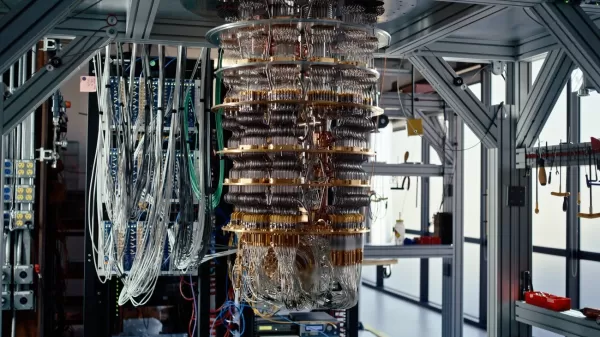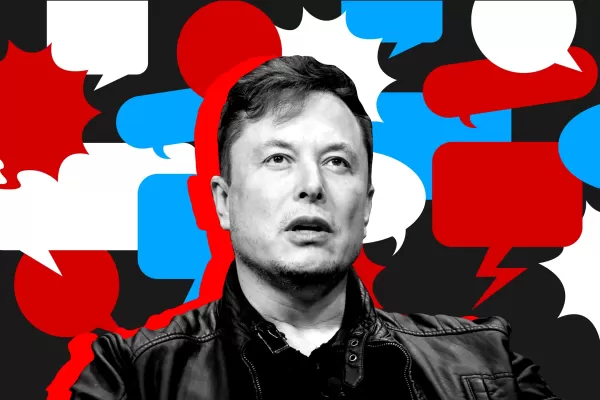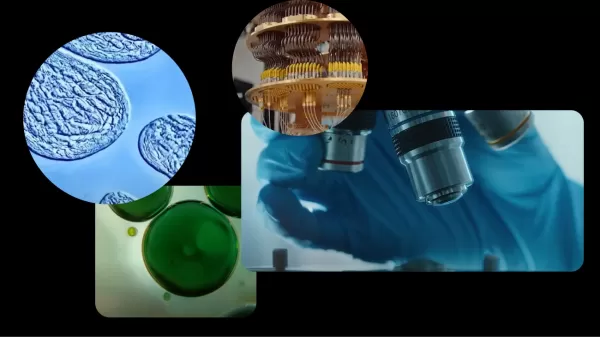Explore Google Quantum AI Lab: Discover the Mechanics of Quantum Computing

Today, Google's Quantum AI team introduced Willow, a groundbreaking quantum computing chip that not only corrects errors at an unprecedented rate but also performs certain calculations faster than traditional supercomputers. This marks a pivotal moment in our quest to develop a reliable quantum computer that will push the boundaries of human knowledge for the greater good. Quantum computing represents a revolutionary leap forward, harnessing the principles of quantum mechanics—the very language of the universe—to transcend the limitations of classical computing.
Join us on a journey into the Google Quantum AI lab, where we'll explore how quantum computing functions and delve into six essential quantum concepts.
Quantum Computing: Why Everything Else is "Classical Computing"
Quantum computing offers a new paradigm in computation. Most of us are accustomed to classical computing, which relies on binary digits, or "bits," that exist as either 1s or 0s. These bits are the foundation of everything from simple calculators to vast data centers, driving the digital revolution of the past 50 years. In contrast, quantum computing employs quantum bits, or "qubits," which operate under a completely different set of rules.
Qubits: The Building Blocks of Quantum Computing
Qubits operate within the realm of quantum physics, where they aren't restricted to just 1s or 0s. Instead, they can exist in a superposition of both states simultaneously. This ability to represent multiple states at once, combined with entanglement—where qubits can be linked to create complex combinations—provides quantum computers with immense computational power. For instance, two entangled qubits can represent 00, 01, 10, and 11 at the same time. This unique capability enables quantum computers to tackle some of the most challenging problems far more efficiently than their classical counterparts.
Fabrication: How the Quantum AI Team Crafts Qubit Chips
Unlike the well-established industry behind classical computing chips, quantum computing is still in its infancy. At Google, we fabricate our qubits in-house using superconducting integrated circuits. By innovatively patterning superconducting metals, we create circuits with capacitance and inductance, incorporating special nonlinear elements known as Josephson junctions. Through meticulous material selection and fine-tuning of fabrication processes, we produce high-quality qubits that can be controlled and integrated into sophisticated devices.
Noise: Building Packaging to Shield Quantum Computers from Disturbances
Quantum computers are incredibly sensitive, capable of solving problems beyond the reach of classical computers, yet they're easily disrupted by "noise"—interference from sources like radio waves, electromagnetic fields, and even cosmic rays. To maintain the integrity of quantum processes, our team constructs specialized packaging. Much like a soundproof studio for recording artists, this packaging connects qubits to the outside world while minimizing external disturbances. This requires intricate mechanical and electromagnetic engineering, along with careful consideration of materials and precise placement of circuitry.
Wiring: Creating Pathways to Control a Quantum Computer
Controlling a quantum computer involves navigating extreme temperature variations. We use microwave signals to manage qubits, transmitting them through carefully selected wires that span from room temperature to near-absolute zero. These wires are chosen for their ability to deliver signals efficiently and accurately. Additionally, incorporating filters along the wiring helps protect qubits from external noise, ensuring their performance remains uncompromised.
Dilution Fridge: One of the Coldest Places in the Universe
Superconducting qubits require temperatures colder than outer space to operate effectively. We achieve these ultra-cold conditions using a device called a dilution fridge. By housing our qubits within this fridge, the superconducting metals enter a state of zero resistance, allowing electricity to flow without energy loss and minimizing thermal noise. This frigid environment enables our qubits to maintain their quantum properties and execute complex quantum computations.
Willow represents a significant advancement in our Quantum AI team's efforts to unlock the full potential of quantum computing. Now that you've glimpsed our lab work, explore our quantum computing roadmap to discover how we plan to transition quantum technology from the lab to practical applications.
Related article
 YouTube Integrates Veo 3 AI Video Tool Directly Into Shorts Platform
YouTube Shorts to Feature Veo 3 AI Video Model This SummerYouTube CEO Neal Mohan revealed during his Cannes Lions keynote that the platform's cutting-edge Veo 3 AI video generation technology will debut on YouTube Shorts later this summer. This follo
YouTube Integrates Veo 3 AI Video Tool Directly Into Shorts Platform
YouTube Shorts to Feature Veo 3 AI Video Model This SummerYouTube CEO Neal Mohan revealed during his Cannes Lions keynote that the platform's cutting-edge Veo 3 AI video generation technology will debut on YouTube Shorts later this summer. This follo
 Elon Musk's Grok AI Seeks Owner's Input Before Tackling Complex Queries
The recently released Grok AI—promoted by Elon Musk as a "maximally truth-seeking" system—has drawn attention for its tendency to consult Musk's public statements before responding to politically sensitive topics. Observers note that when addressing
Elon Musk's Grok AI Seeks Owner's Input Before Tackling Complex Queries
The recently released Grok AI—promoted by Elon Musk as a "maximally truth-seeking" system—has drawn attention for its tendency to consult Musk's public statements before responding to politically sensitive topics. Observers note that when addressing
 AI Accelerates Scientific Research for Greater Real-World Impact
Google has consistently harnessed AI as a catalyst for scientific progress, with today's pace of discovery reaching extraordinary new levels. This acceleration has transformed the research cycle, turning fundamental breakthroughs into practical appli
Comments (14)
0/200
AI Accelerates Scientific Research for Greater Real-World Impact
Google has consistently harnessed AI as a catalyst for scientific progress, with today's pace of discovery reaching extraordinary new levels. This acceleration has transformed the research cycle, turning fundamental breakthroughs into practical appli
Comments (14)
0/200
![MarkGarcia]() MarkGarcia
MarkGarcia
 August 26, 2025 at 1:59:22 AM EDT
August 26, 2025 at 1:59:22 AM EDT
Whoa, Google's Willow chip sounds like a game-changer! Error correction on steroids and outpacing supercomputers? I'm curious how this stacks up against other quantum players like IBM. 🤔


 0
0
![CharlesHernández]() CharlesHernández
CharlesHernández
 August 21, 2025 at 7:01:17 AM EDT
August 21, 2025 at 7:01:17 AM EDT
Wow, Google's Willow chip sounds like a game-changer! Error correction at that speed is wild—makes me wonder how soon we'll see quantum tech in everyday gadgets. 🚀


 0
0
![HaroldHarris]() HaroldHarris
HaroldHarris
 August 7, 2025 at 5:00:59 AM EDT
August 7, 2025 at 5:00:59 AM EDT
Whoa, Google's Willow chip sounds like a game-changer for quantum computing! Super fast and error-correcting? I'm curious how this stacks up against traditional supercomputers in real-world tasks. 🤯 Any chance we'll see this tech in everyday devices soon?


 0
0
![DouglasScott]() DouglasScott
DouglasScott
 August 6, 2025 at 5:00:59 PM EDT
August 6, 2025 at 5:00:59 PM EDT
Wow, Google's Willow chip sounds like a game-changer! Quantum computing is finally flexing its muscles. Can't wait to see how this shakes up tech! 😎


 0
0
![MatthewScott]() MatthewScott
MatthewScott
 April 21, 2025 at 10:41:50 AM EDT
April 21, 2025 at 10:41:50 AM EDT
Probando el Google Quantum AI Lab con Willow y ¡vaya, es como entrar al futuro! La corrección de errores es impresionante y es más rápido que mi antiguo supercomputador. Solo desearía que fuera un poco más amigable para nosotros, los no físicos cuánticos 😅 Aún así, un paso sólido hacia la computación cuántica!


 0
0
![RalphSanchez]() RalphSanchez
RalphSanchez
 April 21, 2025 at 7:36:31 AM EDT
April 21, 2025 at 7:36:31 AM EDT
구글의 Quantum AI Lab에서 Willow를 사용해봤는데, 정말 미래를 경험하는 것 같아요! 오류 수정이 놀랍고, 기존 슈퍼컴퓨터보다 빠릅니다. 다만, 양자 물리학자가 아닌 우리에게는 조금 더 사용하기 쉽게 만들어주면 좋겠어요 😅 그래도 양자 컴퓨팅의 발전에 한 걸음 다가선 느낌이에요!


 0
0

Today, Google's Quantum AI team introduced Willow, a groundbreaking quantum computing chip that not only corrects errors at an unprecedented rate but also performs certain calculations faster than traditional supercomputers. This marks a pivotal moment in our quest to develop a reliable quantum computer that will push the boundaries of human knowledge for the greater good. Quantum computing represents a revolutionary leap forward, harnessing the principles of quantum mechanics—the very language of the universe—to transcend the limitations of classical computing.
Join us on a journey into the Google Quantum AI lab, where we'll explore how quantum computing functions and delve into six essential quantum concepts.
Quantum Computing: Why Everything Else is "Classical Computing"
Quantum computing offers a new paradigm in computation. Most of us are accustomed to classical computing, which relies on binary digits, or "bits," that exist as either 1s or 0s. These bits are the foundation of everything from simple calculators to vast data centers, driving the digital revolution of the past 50 years. In contrast, quantum computing employs quantum bits, or "qubits," which operate under a completely different set of rules.
Qubits: The Building Blocks of Quantum Computing
Qubits operate within the realm of quantum physics, where they aren't restricted to just 1s or 0s. Instead, they can exist in a superposition of both states simultaneously. This ability to represent multiple states at once, combined with entanglement—where qubits can be linked to create complex combinations—provides quantum computers with immense computational power. For instance, two entangled qubits can represent 00, 01, 10, and 11 at the same time. This unique capability enables quantum computers to tackle some of the most challenging problems far more efficiently than their classical counterparts.
Fabrication: How the Quantum AI Team Crafts Qubit Chips
Unlike the well-established industry behind classical computing chips, quantum computing is still in its infancy. At Google, we fabricate our qubits in-house using superconducting integrated circuits. By innovatively patterning superconducting metals, we create circuits with capacitance and inductance, incorporating special nonlinear elements known as Josephson junctions. Through meticulous material selection and fine-tuning of fabrication processes, we produce high-quality qubits that can be controlled and integrated into sophisticated devices.
Noise: Building Packaging to Shield Quantum Computers from Disturbances
Quantum computers are incredibly sensitive, capable of solving problems beyond the reach of classical computers, yet they're easily disrupted by "noise"—interference from sources like radio waves, electromagnetic fields, and even cosmic rays. To maintain the integrity of quantum processes, our team constructs specialized packaging. Much like a soundproof studio for recording artists, this packaging connects qubits to the outside world while minimizing external disturbances. This requires intricate mechanical and electromagnetic engineering, along with careful consideration of materials and precise placement of circuitry.
Wiring: Creating Pathways to Control a Quantum Computer
Controlling a quantum computer involves navigating extreme temperature variations. We use microwave signals to manage qubits, transmitting them through carefully selected wires that span from room temperature to near-absolute zero. These wires are chosen for their ability to deliver signals efficiently and accurately. Additionally, incorporating filters along the wiring helps protect qubits from external noise, ensuring their performance remains uncompromised.
Dilution Fridge: One of the Coldest Places in the Universe
Superconducting qubits require temperatures colder than outer space to operate effectively. We achieve these ultra-cold conditions using a device called a dilution fridge. By housing our qubits within this fridge, the superconducting metals enter a state of zero resistance, allowing electricity to flow without energy loss and minimizing thermal noise. This frigid environment enables our qubits to maintain their quantum properties and execute complex quantum computations.
Willow represents a significant advancement in our Quantum AI team's efforts to unlock the full potential of quantum computing. Now that you've glimpsed our lab work, explore our quantum computing roadmap to discover how we plan to transition quantum technology from the lab to practical applications.
 YouTube Integrates Veo 3 AI Video Tool Directly Into Shorts Platform
YouTube Shorts to Feature Veo 3 AI Video Model This SummerYouTube CEO Neal Mohan revealed during his Cannes Lions keynote that the platform's cutting-edge Veo 3 AI video generation technology will debut on YouTube Shorts later this summer. This follo
YouTube Integrates Veo 3 AI Video Tool Directly Into Shorts Platform
YouTube Shorts to Feature Veo 3 AI Video Model This SummerYouTube CEO Neal Mohan revealed during his Cannes Lions keynote that the platform's cutting-edge Veo 3 AI video generation technology will debut on YouTube Shorts later this summer. This follo
 Elon Musk's Grok AI Seeks Owner's Input Before Tackling Complex Queries
The recently released Grok AI—promoted by Elon Musk as a "maximally truth-seeking" system—has drawn attention for its tendency to consult Musk's public statements before responding to politically sensitive topics. Observers note that when addressing
Elon Musk's Grok AI Seeks Owner's Input Before Tackling Complex Queries
The recently released Grok AI—promoted by Elon Musk as a "maximally truth-seeking" system—has drawn attention for its tendency to consult Musk's public statements before responding to politically sensitive topics. Observers note that when addressing
 AI Accelerates Scientific Research for Greater Real-World Impact
Google has consistently harnessed AI as a catalyst for scientific progress, with today's pace of discovery reaching extraordinary new levels. This acceleration has transformed the research cycle, turning fundamental breakthroughs into practical appli
AI Accelerates Scientific Research for Greater Real-World Impact
Google has consistently harnessed AI as a catalyst for scientific progress, with today's pace of discovery reaching extraordinary new levels. This acceleration has transformed the research cycle, turning fundamental breakthroughs into practical appli
 August 26, 2025 at 1:59:22 AM EDT
August 26, 2025 at 1:59:22 AM EDT
Whoa, Google's Willow chip sounds like a game-changer! Error correction on steroids and outpacing supercomputers? I'm curious how this stacks up against other quantum players like IBM. 🤔


 0
0
 August 21, 2025 at 7:01:17 AM EDT
August 21, 2025 at 7:01:17 AM EDT
Wow, Google's Willow chip sounds like a game-changer! Error correction at that speed is wild—makes me wonder how soon we'll see quantum tech in everyday gadgets. 🚀


 0
0
 August 7, 2025 at 5:00:59 AM EDT
August 7, 2025 at 5:00:59 AM EDT
Whoa, Google's Willow chip sounds like a game-changer for quantum computing! Super fast and error-correcting? I'm curious how this stacks up against traditional supercomputers in real-world tasks. 🤯 Any chance we'll see this tech in everyday devices soon?


 0
0
 August 6, 2025 at 5:00:59 PM EDT
August 6, 2025 at 5:00:59 PM EDT
Wow, Google's Willow chip sounds like a game-changer! Quantum computing is finally flexing its muscles. Can't wait to see how this shakes up tech! 😎


 0
0
 April 21, 2025 at 10:41:50 AM EDT
April 21, 2025 at 10:41:50 AM EDT
Probando el Google Quantum AI Lab con Willow y ¡vaya, es como entrar al futuro! La corrección de errores es impresionante y es más rápido que mi antiguo supercomputador. Solo desearía que fuera un poco más amigable para nosotros, los no físicos cuánticos 😅 Aún así, un paso sólido hacia la computación cuántica!


 0
0
 April 21, 2025 at 7:36:31 AM EDT
April 21, 2025 at 7:36:31 AM EDT
구글의 Quantum AI Lab에서 Willow를 사용해봤는데, 정말 미래를 경험하는 것 같아요! 오류 수정이 놀랍고, 기존 슈퍼컴퓨터보다 빠릅니다. 다만, 양자 물리학자가 아닌 우리에게는 조금 더 사용하기 쉽게 만들어주면 좋겠어요 😅 그래도 양자 컴퓨팅의 발전에 한 걸음 다가선 느낌이에요!


 0
0





























